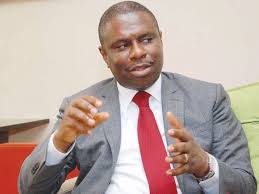The Director General of the Nigerian Maritime Administration and Safety Agency (NIMASA) Dr. Dakuku Peterside, has harped on the importance of the Gulf of Guinea to food security in West and Central African sub-region and charged the various governments to prevent illegal activities that may hamper food supply in the sub-region.
Peterside gave this charged on Tuesday at the seminar on the ‘State of Food Security Assured by the Seas of West and Central Africa and The Perspectives on The Blue Economy in Member States of the Gulf of Guinea Commission (GGC)’ organised by the NIMASA in conjunction with the GGC in Lagos.
The NIMASA boss, who was represented at the event by the agency’s Executive Director, Finance and Administration, Mr Bashir Jamoh, advised that the Gulf of Guinea must be properly guarded if the countries of the region were to properly harness the blue economy for growth.
According to him, the Gulf of Guinea apart from being a major shipping route, is also home for many aquatic species and so the countries of the region must do everything to safeguard the region from illegal fishing, piracy and other activities that may affect the food chain.
He pointed out that NIMASA recognised the importance of the region to the African continent and that was why it has continuously championed collaboration amongst the member-states in order to develop the continent’s blue economy through sustainable shipping.
Peterside projected that the seminar would also assist participating countries to understand the blue economy more and how to properly harness the inherent potentials of the African maritime sector.
In her comments at the event, the Executive Secretary of the Gulf of Guinea Commission, Ambassador Florentina Adenike Ukonga, commended the leadership of NIMASA for the role the agency had been playing in ensuring safety of lives and property in the region.
She said the Commission decided to have a seminar on the blue economy to promote sustainable shipping in the region.
The Gulf of Guinea Commission was established by the treaty signed in Libreville, Gabon on July 3, 2001 by Nigeria, Angola, Gabon and Sao Tome and Principe
Specifically, the commission is a permanent institutional framework for cooperation amongst the countries bordering the Gulf of Guinea in order to defend their common interest and promote peace and socio-economic development based on the bases of dialogue, consensus, ties of friendship, solidarity and fraternity.
The Tuesday seminar was the second in the series organised by the Commission to enlighten member- states on the advantages of sustainable shipping.






